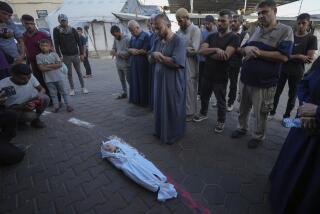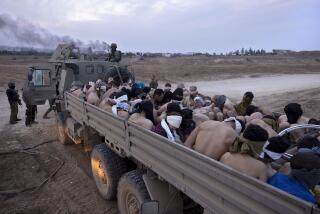U.S. Hospitals in Europe Not Ready for War
LANDSTUHL, Germany — U.S. military hospitals in Europe are quietly taking extraordinary steps to prepare for mass casualties from the Persian Gulf should war break out, but the key facilities still appear woefully ill-equipped to treat large numbers of wounded.
A lack of beds, specialists and burn units have some doctors worried about plans for the three major American hospitals--all in Germany--to serve as a crucial way station for soldiers seriously wounded in the gulf.
And although both sides privately agree that German civilian hospitals could help, no formal request has been made and no specific plan drafted, officials say.
Even now, the U.S. military hospitals here are stretched thin just caring for the hundreds of gulf injured who stream through each month with ankles broken playing volleyball or kidney stones and other ailments aggravated by the desert heat.
The facilities also must continue caring for thousands of American military dependents in Germany. One of the hospitals delivers an average of 100 babies a month.
“It’s flat-out crazy,” said Col. Thomas Verdon, commander of the biggest of the three hospitals, the Landstuhl Army Medical Center. “I’m going to have to worry about women delivering babies here and a guy over there with his legs blown off, or treating a 2-year-old with meningitis while trying to save a guy who’s been run over by a tank and is in renal failure?”
Elective orthopedic surgery has been delayed already at the 97th General Hospital in Frankfurt, a sprawling Nazi-era relic which has seen more than 800 Desert Shield patients, according to its commander, Col. Richard Kirchdoerfer.
Verdon, the only one of the three commanders to serve in Vietnam, insisted in a recent interview that it is impossible for medical personnel to be fully prepared for hostilities.
“You’re never ready for a war,” he said. “Anybody who tells you they’re 100% prepared is a fool.”
The Air Force is capable of evacuating 1,000 patients a day from the gulf to Germany, a flight that lasts anywhere from five to eight hours, depending on the type of aircraft.
But Landstuhl, the Army’s 97th General Hospital in Frankfurt and the Air Force’s 7100 Combat Support Wing Medical Center in Wiesbaden together have fewer than 1,000 beds, only one neurosurgeon, one cardiovascular surgeon and the ability to handle a total of just six seriously burned patients.
The lack of staff and equipment to care for a greater number of acute burns is considered particularly worrisome because the likelihood of tank battles and Iraqi mustard gas attacks would mean more burn victims than in previous wars.
“If there are many burn patients, it’s going to be trouble with a capital ‘T,’ ” said Verdon, whose hospital is the only U.S. military facility on the Continent with any burn unit at all.
Already, the hospitals are bracing for war by training military dentists to become anesthesiologists, ordering extra beds and holding crash courses for their staffs in everything from personal stress management to diagnosing sand-fly fever.
Officials also privately acknowledge that plans are under way to activate three contingency hospitals in Britain and one in Germany, if needed. The secret “turnkey” facilities are fully equipped, unstaffed phantom hospitals that are opened only when disaster dictates. The number of beds and the exact location of each facility is classified.
Backup hospitals also exist in Italy and Greece, and patients also might be flown to three Royal Air Force bases in Britain and to Incirlik Air Base in Turkey.
There is a general reluctance by doctors, military officials and even the German government to discuss plans for handling any war casualties for fear of panicking the American public, many of them said. The medical commanders in Germany all said that projections on the number of casualties are considered classified as well.
One concern being raised here is the relative inexperience in dealing with war wounded among military doctors today. The majority of medical personnel who served in Vietnam have either left the military or retired.
“That concerns me,” said Col. Earl Ferguson, commander of the Air Force facility in Wiesbaden, who recently returned from a combat casualty course for commanders in the United States.
“We’re educating people as rapidly as we can,” he said. “The absolute worst place in the world to deploy and fight is the Persian Gulf. There are problems with extreme heat and cold--people froze to death on raids with Lawrence of Arabia.
“There are also all kinds of infectious diseases. About 80% of the people hospitalized in Vietnam were there for diseases.”
A recent draft report by the Walter Reed Army Institute of Research described numerous diseases and non-battle injuries threatening the Desert Shield troops, including typhoid, plague, cholera, rabid packs of feral dogs and scorpions whose sting can kill a man in four hours.
Doctors here are also worried about the psychological trauma their own staffs might suffer treating war wounded for the first time in their careers. Like combat soldiers, untold numbers of doctors, nurses, Red Cross volunteers and other medical personnel are known to have returned from Vietnam with the same crippling flashbacks and emotional troubles associated with post-traumatic stress disorder.
Ferguson hopes to obtain a 10-year-old film from the United States to show his staff what war wounds look like.
“They’ll have to make a psychological adjustment,” he said.
In Landstuhl, Verdon is also concerned about the emotional impact treating war wounded would have on his staff and has been encouraging them to learn stress management techniques.
“I tell them there should be no more iron men, even if they ever did exist. It’s no fun seeing an 18-year-old with his arms and legs blown off,” he said. “I want them to know there’s nothing wrong with saying, ‘I need help.’ We’re dealing with big egos, and it’s very difficult for physicians to say that.”
The three commanders in Germany all reported adequate supplies and said they feel confident that more beds and staff reinforcements will be available if war breaks out.
Although existing agreements between the U.S. military and German community hospitals spell out such cooperation in event of a natural disaster or emergency such as a plane crash, no plans have been made public for help in dealing with gulf casualties.
Germany already has come under some international criticism for not sending troops to the gulf and for failing to crack down on German firms reportedly breaking the embargo against Iraq.
Several major German hospitals contacted by The Times said they consider it a political decision left to the Bonn government whether and how to help the U.S. military cope with the flow of gulf wounded in event of war.
“At this point, there is no official request or agreement with the Americans,” said Hans Peter Gaertner, spokesman for the German chancellor’s office.
“Of course the federal government would help if help is necessary,” Gaertner said in a telephone interview. “But we do not believe that this will become an official matter because if you start asking openly about hospital beds now, it could lead to panic among the American public.”
Anticipating a staff shortage in key departments, the Air Force already is cross-training medical and administrative personnel at Wiesbaden.
“We have four operating rooms and could go to nine, but we would need extra nurses and anesthesiologists,” Ferguson said. “So I took seven dentists from our dental clinic who are already trained in IV and nitrous oxide and put them through 16 hours of training as anesthesiologists.”
Ferguson also said the orthopedic ward would likely be overwhelmed with war casualties, which would mean a greater demand for X-rays. He is currently training 11 dental technicians to load and develop X-rays and do the administrative paperwork required by the radiology department.
“There are all kinds of little adjustments you can make that markedly increase your capability,” Ferguson said.
Desert Shield patients who cannot be treated in the field are currently flown to Rhein-Main Air Base near Frankfurt, where a medical team quickly evaluates them and sends them by bus or ambulance to one of the three military hospitals. The same system would continue in the event of war, with helicopters on hand for speedier transfers, if necessary.
In Landstuhl, the staff recently underwent extensive training in treatment of wounds inflicted by chemical weapons because the United States was removing its chemical weapons from German soil and trucks carrying the deadly materials were passing by Landstuhl, according to Verdon.
“You talk about serendipity,” the commander said. “We moved all the chemical weapons out of Germany, and so we were trained in case a truck turned over or terrorists shot a rocket through one.
“I hope, I pray, that nothing happens,” he said of tensions in the gulf. “But if it does, we’re as ready as we can be. But you can never know.
“War throws a lot of curve balls.”
More to Read
Sign up for Essential California
The most important California stories and recommendations in your inbox every morning.
You may occasionally receive promotional content from the Los Angeles Times.










